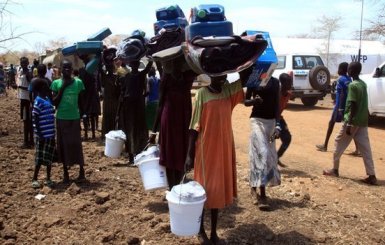Influx of S. Sudan refugees to Ethiopia sees sharp decline
By Tesfa-Alem Tekle
November 14, 2015 (ADDIS ABABA) -The number of South Sudan refugees crossing borders to Ethiopia due to the armed conflict at home has saw a significant decline during the recent weeks, a UN refugee agency official told Sudan Tribune on Friday.

Last year an average rate of up to 2,000 refugees per day had been crossing borders to Ethiopia to escape fierce fighting between the South Sudan government and SPLM armed opposition group led by Riek Machar.
The decline was observed after the signing of the compromised peace agreement last August between the two warring factions ending the nearly two-year long conflict in the youngest nation.
Last week, the two warring parties signed an agreement on final security arrangement which would lead for the two sides to fully implement the final peace agreement and form transitional government before mid January 2016.
Ethiopia currently hosts the largest number of South Sudanese refugees who fled home to escape violence.
Sudan Tribune was told that currently Ethiopia hosts nearly 290,000 South Sudanese, other than those tens of thousands who fled to Ethiopia before eruption of the latest conflict.
South Sudan refugees are currently being sheltered at camps in Gambela region bordering South Sudan.
Last year, Ethiopia was forced to open new camps to cope up the huge influx of South Sudanese refugees.
Although the decline in influx could be taken as a sign of improved security in the country but the UNHCR official said still few numbers of refugees continue to stream in to Ethiopia out of fear of renewed violence and food insecurity.
Although the final peace deal is signed between the two conflicting parties, exiled South Sudanese doubt the signatory parties would take a firm commitment to translate the agreement in to practice.
A number of south Sudanese communities continue to urge the parties to implement the agreement faithfully.
South Sudan’s Gaajiok community in Kenya has called on the two principals (President Salva Kiir and Riek Machar) to abide by the terms of the peace deal and demonstrate a genuine political will to implement the peace agreement.
In a statement sent to Sudan Tribune, Gaajiok community chairperson in Kenya Bang Tut urged all the parties who contributed to the peace talks, to take the implementation process a serious matter.
“As the citizens of the country we are very desperate of peace. We are yearning for peace” Tut said adding “you need to implement this peace as your obligation”.
The conflict in South Sudan erupted in mid-December 2013 between forces loyal to Kiir and those backing former vice president Machar.
The violence which quickly spread across the country killed tens of thousands of people and forced an estimated two million flee their homes.
(ST)
